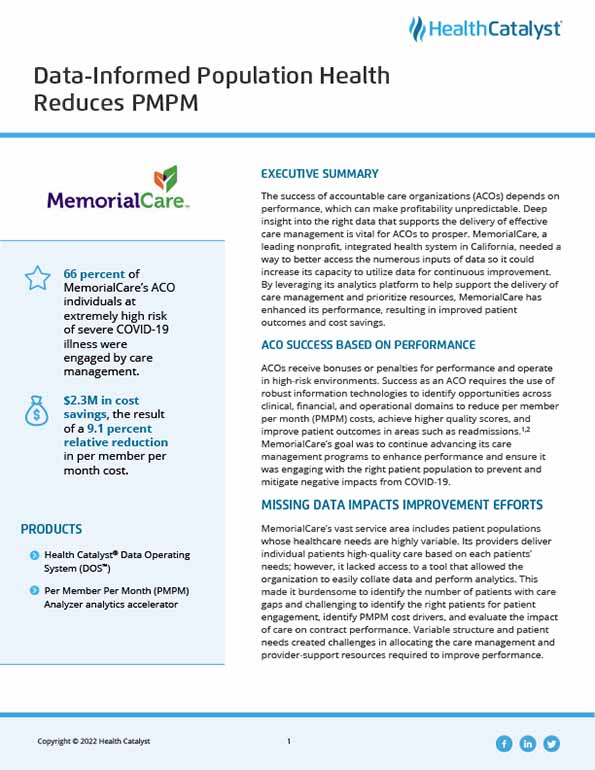The success of accountable care organizations (ACOs) depends on performance, which can make profitability unpredictable. Deep insight into the right data that supports the delivery of effective care management is vital for ACOs to prosper. MemorialCare needed a way to better access the numerous inputs of data so it could increase its capacity to utilize data for continuous improvement. By leveraging its analytics platform to help support the delivery of care management and prioritize resources, MemorialCare has enhanced its performance, resulting in improved patient outcomes and cost savings.
ACOs receive bonuses or penalties for performance and operate in high-risk environments. Success as an ACO requires the use of robust information technologies to identify opportunities across clinical, financial, and operational domains to reduce PMPM costs, achieve higher quality scores, and improve patient outcomes in areas such as readmissions.1,2 MemorialCare’s goal was to continue advancing its care management programs to enhance performance and ensure it was engaging with the right patient population to prevent and mitigate negative impacts from COVID-19.
MemorialCare’s vast service area includes patient populations whose healthcare needs are highly variable. Its providers deliver individual patients high-quality care based on each patients’ needs; however, it lacked access to a tool that allowed the organization to easily collate data and perform analytics. This made it burdensome to identify the number of patients with care gaps and challenging to identify the right patients for patient engagement, identify PMPM cost drivers, and evaluate the impact of care on contract performance. Variable structure and patient needs created challenges in allocating the care management and provider-support resources required to improve performance. MemorialCare needed a data and analytics solution that would enable more efficient identification of patients that could benefit from care management and the drivers of PMPM costs and enable the organization to maximize the impact of engaging high- and rising-risk patients in care management.
MemorialCare leverages the Health Catalyst® Data Operating System (DOS™) platform and a robust suite of analytics applications, including a PMPM root-cause analytics accelerator, to gain insight into performance. The improved data helps the organization support providers and care managers to ensure patients receive the right care in the right location, prevent unnecessary overutilization, and improve contract performance.
The organization performs comprehensive, deep-dive analyses to reveal the factors that drive PMPM performance, identify areas for improvement, and manage costs to realize savings and avoid losses. MemorialCare uses the analytics accelerator to review claims-based data and evaluate the drivers of PMPM performance. The organization can visualize an in- and out-of-network view of payment trends, enabling it to understand how the providers, members, and specialty areas contribute to overall PMPM payment performance, providing insight into opportunities for reducing PMPM.
MemorialCare’s clinically integrated network (CIN) supports primary care providers in delivering needed primary and specialty care. Network and provider performance targets and improvement goals align with the goals in its various contracts. The organization allocates its care management team members to support specific regions, providers, and patients within the CIN. MemorialCare uses standard work for care transitions and ongoing care management activities. The care management team leverages patient risk-stratification data to identify high- or rising-risk patients for outreach, engaging patients in care management activities that ensure the patients receive the right care in the right location. MemorialCare uses a COVID-19 risk for mortality algorithm to identify and risk-stratify members at the highest risk of mortality from COVID-19. Care managers can visualize at-risk members and can quickly prioritize member lists for outreach.
MemorialCare analyzed its data to identify opportunities for improvement, including emergency department (ED) utilization, network leakage, and brand-name prescription use. For example:
The care management team and providers meet monthly to review data to increase understanding of performance, continually improve processes, learn from successes, and identify future improvement opportunities.
MemorialCare’s data-informed care management interventions have demonstrated the desired results. Patients receive the right care in the right location, and the organization has reduced overutilization and improved contract performance. The COVID pandemic also reduced utilization of health care services. Results include:
"Using the PMPM Analyzer has allowed us to understand contract performance and the drivers of PMPM. Our care management teams are able to focus on ensuring patients receive the right care and improve contract performance We’ve improved health outcomes for the patients we serve while decreasing PMPM."
- Linda Violas, BSN, RN, PHN, Executive Director ACO, MemorialCare
MemorialCare will continue to use its data and analytics to identify opportunities to improve the effectiveness of its care management programs while also improving contract performance.


